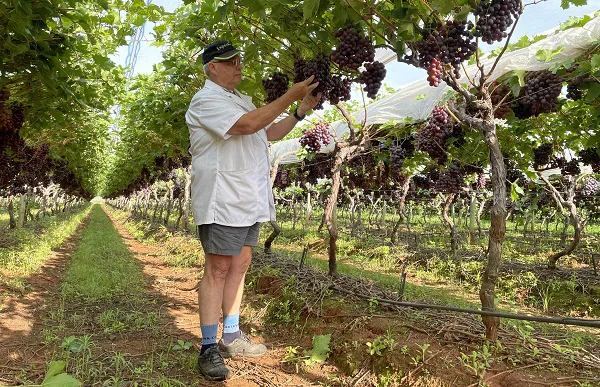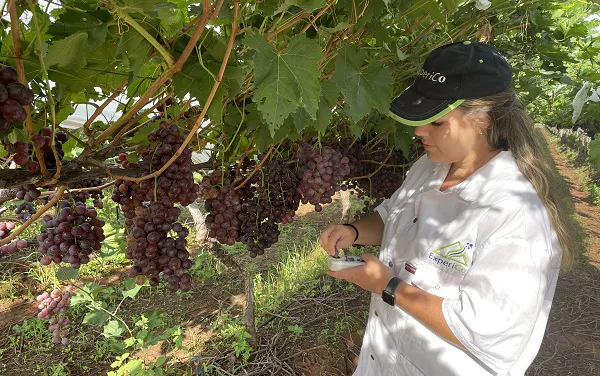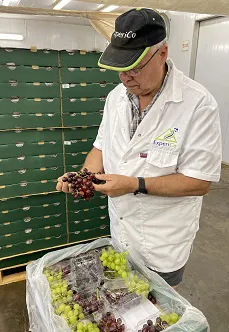The number of hectares of table grape vineyards being monitored by ExperiCo Agri-Research Solutions in the Limpopo Province, from before the start of the harvest and in the packhouse, has increased fivefold to around 1,000 ha of over two years, assisting farmers in minimizing risks and possible quality claims.
The disease risk management system (DRMS) developed by Dr Johan Fourie at ExperiCo is based on the monitoring of grape vineyards and packhouses, in an attempt to quantify the level of risk prior to transport and marketing. Production and quality parameters, as well as signs of damage and decay are carefully monitored. Wounds, caused by insects, birds and mechanical damage serve as gateways for pathogen infections.
 Dr Johan Fourie inspecting grapes (photos supplied by ExperiCo)
Dr Johan Fourie inspecting grapes (photos supplied by ExperiCo)
The DRMS programme has been expanded the past season to the Northern Cape, covering approximately 200 ha of vineyards. Table grape growers in the Western Cape would also benefit from their risk control system and advice, says Dr Pieter Louw, postharvest pathologist at ExperiCo.
”Botrytis spores are always present in the environment and readily enter through wounds,” he explains. “There are many decay-causal pathogens, but Botrytis presents the biggest threat to table grapes – they like the same things we like in grapes, such as sugars, and will cause decay if conditions are conducive.”
The specific stage of a grape’s development contributes, to a large extent, to the postharvest decay and quality risk. The closer to harvest, the higher the sugars in the grape berry, hence the higher the risk of berry split under rainfall and humid conditions, increasing the risk for Botrytis infections. “It is a challenge for grape producers across all table grape producing countries to harvest grapes when rain occurs,” he says.
"We are about midway through the season in Limpopo and the Northern Cape. We have seen rainfall in both these areas. The vineyards are in general doing well, with minor concerns. Most producers are doing an excellent job keeping the disease risk to a minimum."
 Anné Matthee of ExperiCo
Anné Matthee of ExperiCo
Now producers can have a risk report in hand
A new feature that ExperiCo is offering this year is a real-time risk report generated with the use of an app, whereby data capture in the vineyard and packhouse, is transformed to an one-page report. The report generated within 24 hours after the assessment entitles producers to perceive, in a single glance, where the problem areas are and where remedial actions are required to reduce postharvest quality risks.
Dr Louw remarks that a number of risk mitigation actions can be followed, depending on the problem area identified. If there are problems in vineyards, cleaning-up bunches by sanitation in the vineyard is advised, followed by application of appropriate and acceptable fungicides or biofungicides, as well as selective harvesting to avoid bringing infected grapes into the packhouse.
Packhouse procedures According to Dr Fourie, something that should be advocated is the cleaning and sanitisation of work surfaces according to a fixed schedule with an approved chemical that won’t leave any residue.
According to Dr Fourie, something that should be advocated is the cleaning and sanitisation of work surfaces according to a fixed schedule with an approved chemical that won’t leave any residue.
"In the packhouse we look at, among other things, cooling systems, damage and decay of berries, whether bag perforations are open or not, the use of MAMs (moisture absorbing materials) and SO2 sheets.”
The data from the vineyards and the packhouses could potentially be combined with a GIS system, for producers to view in future on a dashboard, incorporating weather data and the records of previous seasons to show which blocks have been problematic in the past, and the potential reasons.
“From such data you could draw conclusions regarding a whole range of aspects like rootstock and microclimates and quality risks. This is something we’d like to offer in the future.”
At this stage the ExperiCo focuses is on table grapes because of their years of table grape experience, thanks to Dr Fourie who was instrumental in the development of this programme and the sulphur dioxide laminated sheets widely used in the table grape industry.
"Our vision is to expand the risk management system in the future to incorporate blueberries, topfruit and stonefruit, offering growers a potential benefit from getting a firm and traceable grip on managing postharvest decay."
For more information:Dr Johan Fourie
ExperiCo
Tel: +27 21 887 1134
Email: johan@experico.co.za
Dr Pieter Louw
Tel: +27 21 887 1134
Email: pieter@experico.co.za
www.experico.co.za
